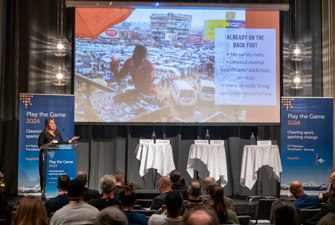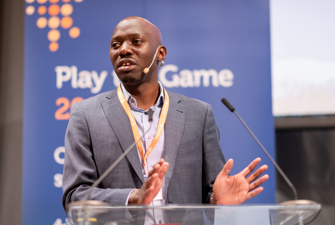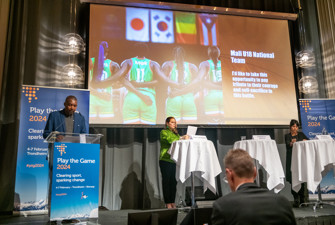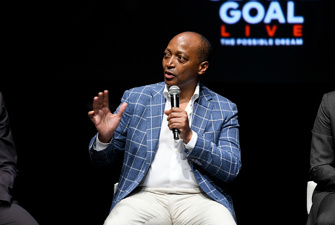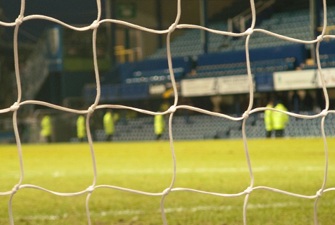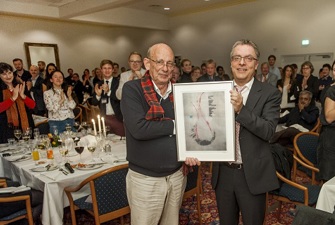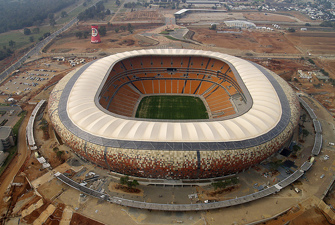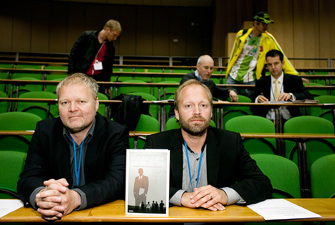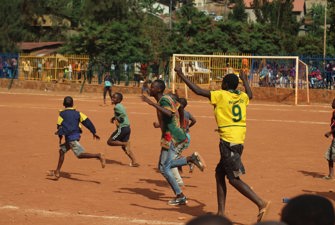Using Sports in National Development
In order to understand the link between sport and national development the logical starting point is to take an overview of the fundamental benefits of sport from the perspectives of individual requirements.
Introduction:
In order to understand the link between sport and national development the logical starting point is to take an overview of the fundamental benefits of sport from the perspectives of individual requirements. We must pay more attention to the humanistic aspects of sport in order to broaden our understandings of sport in national development. In this regards, in order to underline the significance of this topic, we must look at sport from the point of view of a broad spectrum primarily focusing on sport as a means to achieve health standards and enjoyment.
Secondly, to look at sport as a means to built a strong character and confidence and therefore prepare the youth to be in a better position to meet the challenges in a competitive world.
Third and most importantly, to look at sport from a national point of view as one of the means with immense potentials to resolve conflicts and to create cohesiveness in a society by promoting unity within a nation. When sport talents are discovered and developed to the highest level can serve to bridge the gap in countries affected by tribalism, a common cancer that has been a source of conflict among many nations. Vicious ethnic wars and strife as recently witnessed in Yugoslavia Somalia and Rwanda are a few examples. It is ironic that most countries do not give much credence to sport yet if every citizen were healthy and performing at optimal capacity there would be much production and hence a vibrant economy. In short, sport must be seen from the point of view ofnational strategic development in terms of human resources and development.
In this regard, the research in sport science holds the master key in efforts to achieve sustainable national sport development. The magic of sport fever in capturing some of the intrinsic human values has never been exploited to the benefit of mankind first and foremost in terms of health standard and secondly in terms of economic development.
The Role of Sport on Health Standards
One of the drawbacks of industrial revolution is the sedentary lifestyle we have adapted which is directly linked to primary and secondary diseases, such as heart problems, high cholesterol, mental stress, high blood pressure and on top of all that is the environmental pollution, which is currently one of the risk factors of global magnitude. In order to understand how the human body functions under ideal conditions we must go back to the basics.
This understanding is very important, to enable us imagine and visualize what we need to do in order to lead a healthier life which is a critical dimension in the prosperity and development of every nation. As already pointed out, a high health standard translates into higher productivity and greater national prosperity. We must constantly remind ourselves that we are descendants of hunters and gatherers of food and that since the creation of mankind the human life has been characterized by numerous physical activities as opposed to sedentary lifestyle we have recently embraced.
Our biological adaptations require regular physical exercise more or less typical to that of a hunter and a gatherer, as our ancestors did, to enable our vital organs to function at an optimal level. The above discussions underscore the importance of physical exercise or sport as a fundamental requirement for every individual (sports for all) regardless of age, race or gender. Sport leisure and recreation have become important dimensions in social and economic life. Social amenities such as the gymnasiums, fitness centers, play fields, social halls and swimming pools generate revenue for self-sustainability and therefore contribute to national development on two fronts.
The people of Africa who live in the rural areas and engage in regular physical activities have fewer problems related to sedentary life compared with citizens from industrialized nations. It therefore comes as no surprise that most African athletes from the rural communities have been quite successful in endurance sports although the urbanized Africans are succumbing to this fate. As a case in point, the rural runners from both Kenya and Ethiopia have been very successful in middle and long distance.
There is no doubt these athletes would be equally successful in any other endurance sport, such as cycling, cross country skiing, swimming etc. if given the opportunity and the necessary equipment. To reap the benefits of sport on a wider scale we cannot continue to rely on our traditional strong holds in sport but we must strive to diversify the provision and development of sport. In addition, this will make it possible to offer a wide choice of sport disciplines so a to accommodate the requirement of the majority of the people and to capture talent on a wider scale. This will only be made possible if sport is prioritized in the national development planning and economic strategies.
The Role of Sport in Nation Building
Needless to say, apart from religion, sport is the only forum that can bring people together for a common goal. It is possible that sport, through the International Olympic Committee (I.O.C.), and the International Sports Federations could succeed where the United Nations has failed to promote world peace.
However, to the contrarily, sports has been used, in the past, as a political weapon to express dissatisfaction by boycotting the Olympic games. If sports can be used to achieve political objectives, it is possible to use sports to achieve and promote peace initiatives at local, national and international levels.
Since sports can play such important roles, in the process of national development as outlined above, there must be deliberate plans to promote and develop sports on a wide scale in order to achieve maximum benefits. Unfortunately, this has not been the case, as sport development is marginalized by many nations in budgetary allocations.
In most countries sport is seen as indirectly related to the national development. Indeed many countries do not have a Ministry of Sport and in the absence, the sport portfolio is lumped in with other government departments where sport is merely seen as a voluntary enterprise and luxury most poor nations can ill afford. It is obvious that the role of sport in the national development efforts has not been well articulated and understood.
The Link Between Sport and Development:
A good example is the case of the Mathare Youth Sport Association (MYSA), which strategizes the use of youth soccer programmes in the slums of Nairobi to bring hope to the lives of thousands of destitute children in the slums. Taking the advantage of soccer fever in the slums, the MYSA programmes have been able to make a major breakthrough in crating sustainable programmes in the fight against the rampant drug abuse in the slums, slow down the crime rate, make an impact on school dropout and create positive attitude and hope among thousands of children in the slums.
As a marketing strategy and a role model for the kids in the slums, the MYSA established a Mathare United Football Club (FC), which has risen in ranks to become a formidable football club in the super league division. This year the Mathare United FC won the Moi Golden Cup and is poised to win the Premier League.
What is important to note is that all the players of the Mathare United FC hail from the slums of Nairobi and are role models and a source of inspiration to all the children in the slums. All the players of the Mathare United FC are required to do 80 hours per month of garbage cleanup in the slums as part of MYSAs golden environmental objectives. The slogan of MYSA giving the youth a sporting chance epitomizes MYSAs philosophy of inspiring the kids through sport to be positive and to accept the challenges in life.
According to the saying, the strength of the rope lies in its weakest point similarly the strength of the national development lies in its weakest point. In using the above analogy, any meaningful national development must focus on its weakest points. In Africa and also elsewhere the national development strategies must focus on the poor in the urban and rural sectors in order to achieve sustainable development. MYSAs philosophy and strategies are gaining acceptance and appreciation beyond the Kenyan boundaries and has over the years received moral and material support form Norway through Stromme Foundation.
There is little doubt that the poor in both the urban and the rural sectors in the developing countries are often overlooked at national economic strategic plans. Following the above discussions it is evident that using sport to raise the level of living standard in the slums is imminently plausible.
The poor children in the slums cannot be held responsible for the abject poverty and the helplessness in which they find themselves. Their problems are manifested in drug addiction and high rates of crime among the many social problems. However, MYSAs programmes have convincingly demonstrated that this situation can be reversed using sport as one of the means to bring solution to the many problems in the slum.
Although the tasks of trying to solve the problems of the slums seem too overwhelming they are not insurmountable. As already pointed out, in general, there are many impediments that hamper the development of sport in Africa such as lack of planning, ethnic strive, lack of information, poverty and subsequently poor funding and not to mention the natural calamities such as the constant drought. Most of these problems could be solved through equitable distribution of resources, prioritization and good planning strategies.
The developed countries are also shifting focus to the poor neighbourhoods. As reported by the Keeping Track us based sports newsletter of November 2000, the British government is fledging 230 million pounds to improve facilities in the low income neighbourhoods.
The Need to Diversify Sport Development
For a long time it has only been the African men bringing Olympics Medals to their countries but recently the African women are now rising into the limelight of big time sports. Although the momentum is on, there are many factors that militate against the development of women sports and they still have a long way to reach the level of European and American women especially in sport requiring high skill development.
In general, for both men and women in the continent of Africa, sports that require high level of skill development are lagging behind the rest of the world. As already stated, although Africa is rich in natural economic and human resources, there are several logistical problems making it rather impossible to tap the talents, which are known to be quite abundant in virtually every sport.
During the Atlanta Olympics and the recently concluded Sydney Olympics, however, the Africans featured competitively in 3 sports, namely boxing, athletics and soccer out of about 26 Olympic sports. There is need for the African countries to have full knowledge of their own resources and potentials and the desire to exploit them for their own benefits. Kenya and Ethiopia have succeeded in middle and long distance running with minimum investment.
There is an urgent need to promote sport technology in Africa so as tap exceptional talents as part of a campaign to raise the standards of sports worldwide. Secondly, the potential of using sport as a springboard to achieve other human values directly or indirectly in order to raise the standards of living conditions need to be fully exploited.
As already stated many exceptional sports talent in Africa is untapped because of lack of proper network for talent identification and development. In recent years, Kenya surprised the world by beating the famous West Indies cricket team, a sport that has always been a preserve for the developed commonwealth countries and the Asian nations.
Also, during the last winter Olympics, two Kenyans opted to change from running to skiing and with a sponsorship from Nike Sports manufacturers of the United States and Finnish Skiing Federation the two runners made impressive performance at the Nagano, Winter Olympics. This shows that the talents of the Africans are not only limited to the traditional events but we are indeed capable of diversifying talents in order to venture into non-traditional sports. Africans, therefore, have the potentials to excel in a wide range of sport disciplines to make the Olympics and the world championships more exciting and competitive. If sports development is synonymous with economic development as discussed above, then it would be wise for the African countries to use sport as one of the means to achieve economic impact.
Using Sport to Fight the Social Problems
It is evident that most of the countries in Africa are losing war against social problems, the spread of infectious diseases especially the HIV AID, the drug abuse and the crime rate. Certainly, sport can be used to change the attitude of the people in the slums and bring hope to their lives. As already pointed out, a breakthrough in sport development at national and international level may reduce poverty, ethnic strives and genocide, such as the one already mentioned. This is not implying that sports is a panacea to every social and economic problem.
When we associate sport with health standards it means that the maladies such as malaria do less damage to individuals who are healthier than those who are already weak. Also, healthy living and stress free environment have been known to promote the quality of life and prolong the lives of the people infected with HIV AID. Over and above the economic links, the benefits of sports and its association with health standards are unlimited. We can no longer underestimate the potential of modern sports as an industry that can positively impact on the social, economic and political parameters in the process of nation building. The African countries have taken little effort to acquire the above benefit as a result of lack of development in sport.
In the modern era, sport has gone through a series of transformation to evolve into an industry and a showcase for entertainment extravaganza. Since the advent of industrial revolution, the electronic and the print media have not only popularized sport but have brought top-level sports to every family via the satellite and the Internet. While this electronic revolution has created a positive impact on the love and popularity of sports viewing, there is an imminent danger of creating a society of spectators and people who will appreciate and enjoy sports passively.
One most intriguing question is whether professionalism and commercialization of sport has taken precedence over the important requirement of sport for all. This point becomes evident when an important marathon race is staged to favour television viewing rather than the important consideration of the health of the athletes. While professional sport has certainly an important role on economic parameters there is need to look at both sides of the coin in terms of sport values versus economic gains.
In addition to the benefits already discussed, the sport industry has the potentials for employment opportunities to tap talents of the experience staff forced into early retirement through retrenchment processes. Sport industry also offers opportunities to young professionals in Physical fitness and sport science.
Sport as an Industry
So far the continent of African has made a moderate impact in soccer and athletics (track and field) while in other sports; the performance has been marginal. There are quite a number of African soccer players playing for the professional clubs in Europe and they are doing a good job. In athletics, a number of African athletes have been able to earn money through the Grand Prix circuits. So far the African Sport men and women have not contributed much to the economy of their countries mainly because the African Countries are unable to stage professional championships.
The African Super stars in Athletics run in Europe since the major grand prix meets are staged in Europe. Like wise the top African football players play for major clubs in Europe and therefore contribute to the revenue of their European clubs than their homeland. For the majority of athletes, the athletic career is not only a poor mans sport but unpredictable and short-lived. The turnover rate among the Kenyan athletes is approximately 40% or more, which is a great setback.
The major impact that African football players and star athletes generate, for their homeland, is their role as roving ambassadors or ambassadors of goodwill. This is of course an important dimension in the process on nation building. In most African countries, sport is seen as a service programme and not as a potential industry to generate revenue but on the contrary, most countries see sports as a financial liability.
This is one of the major reasons for under development of sport in the continent since the benefits and the role of sport have not been well defined and articulated. The potential of soccer to generate revenue in Africa is unlimited but untapped. Most major soccer clubs in the continent are merely struggling to make ends meet. However, big soccer clubs like the AFC Leopards, in Kenya have not taken advantage of massive support of more than 2 million committed fans.
Membership fee alone at Kenya Shillings 200, equivalent to 2* US dollars, could raise 200 millilion Kenya Shillings which could make the club the richest in the country. With adequete funds the club would be able to succeed in paying the players well and running its programmes moresuccessfully and to place itself in a position to raise more revenue through other sources. What is lacking in AFC, as in many other major soccer clubs, is the sophistication in registration process, transfarency and professional managerial skills in order to provide effective and efficient administration for the club.
The Link Between University and Sport Development
In spite of the many setbacks stated above, Africa and, in particular Kenya and Ethiopia, has immensely contributed to the Olympic success over the last thirty years. However faced with the current drought and the numerous economic problems, these countries continue to be adversely affected in their sport and promotional development efforts.
As a gesture of appreciation, the Olympic Movement, through the solidarity funding, should offer financial and material assistance to Kenya and Ethiopia and this support to be channeled through the national universities offering physical education. This will make it possible for these countries to diversify sport development and conduct research in sport science and offer sport scholarships.
This is in view of the fact that most of the participants at the Olympic games, from the developed countries, are university students. The university students hold the most distinct promise as the most potential Olympic participants because they are in the prime of their youth and the most knowledgeable group. The population of the university students in Africa is rising. In order for the African universities to make an impact on economic and social development we must emphasize applied research in all spheres of human development, which must include sport. Currently research and development in sport science among most African Universities is non existent.
Recommendations:
- Every nation should make sport development as an integral part of national economic strategic planning.
- There is need to define and articulate sports policies in order to incorporate sport in the national development strategies.
- The benefits of sport in terms of human and economic development cannot be left solely in the hands of the none governmental organizations and volunteers but each nation should ensure the provision and equity of the distribution of resources especially among the poor communities.
- Soccer and other sports to be used in the slums and poor communities to combat social problems and to offer a sporting chance to the kids in the slums.
- There is an urgent need for the African Universities and Institutions of higher learning to reevaluate their curriculum in order to put more emphasis on human resource and development in sport science.
- There is need for the IOC to invest in sport development including research in sport science among the African nations that have contributed to Olympic success over the last 30 years.
